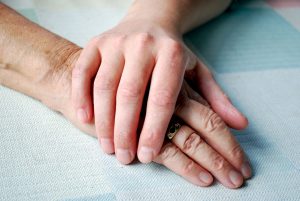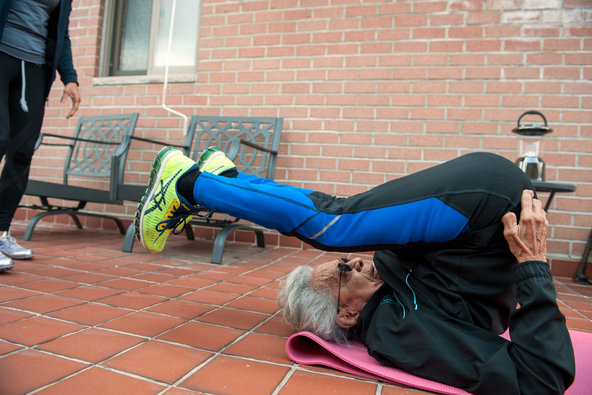Donald Trump has inspired me. Lit a fire, to be exact.
I know we’re up to our eyeballs in angry, divisive, political rhetoric and we can’t stand it for one more minute.
But Mr. Trump’s Access Hollywood tape has stirred me to write about something deeply important – to all of us.
I’m talking about the tape where Mr. Trump brags about sexually assaulting women. And I’m talking about the way he has demeaned both both women and men all throughout this political season. The put-downs, the threats, the demeaning talk.
As human beings, we can do so much better than this.
So, why would this inspire me – light a big fire? Because I write about how to simplify your life, and Mr. Trump’s demeaning talk has awakened in me the true meaning of simplicity – the heart of it all. Let me explain.
Most people think that simplifying your life means that your closet is beautiful and simple and your drawers are organized. Simplicity does, indeed, mean that – but it’s about much more.
Or they think that simplifying your life means you don’t have consumer debt. It means that, too, but it goes much deeper.
People think the pinnacle of a simple life is being financially free or retiring early. These indeed are fabulous goals but there’s more.
Simplicity is about who you are as a human being.
Because if you’re unkind to people, it doesn’t matter how simple your life is.
If you’re in the habit of tearing people down to feel better, it doesn’t matter how much money you have in the bank.
If you spend your time judging yourself and other people, it doesn’t matter whether you’ve paid off your debt.
If you’re unhappy – you can have the most simplified life imaginable and it doesn’t matter.
The real, true reason why simplicity is so beautiful is because it’s it’s about clearing away what’s in the way of you becoming the best human being that you can be.

It’s hard to be your best when you’re worried and burdened
You see, it’s hard to be your best self when you’re up at night worried about how you’re going to pay off your debt. It’s hard to become your best when you feel dejected every time you walk in your house and feel overwhelmed by all that you have to do. It’s hard to become your best when you feel trapped in a job or career you dislike.
That’s why you simplify – to free yourself from feeling so burdened, trapped and overwhelmed that you have no time or energy to be your best.
A couple I interviewed for my book, The Simple Living Guide, said it so well:
“The bottom line for us is, if you can become self-sufficient in the basics of life, which are shelter, nutritious food, and clothing…if you have these things covered, then all you have to do with the rest of your time is make yourself a peaceful person, rather than spending that same time buying things you don’t need.”
Donald Trump’s rhetoric stirred me to write this because I want so much more for us as a country and as a world.
We can do so much better
I dream of a world where we care about each other.
I dream of a world where we have the courage to look ourselves in the mirror and ask if we’ve been the best human being we could be that day.
I dream of a world where we notice when we’re treating our partners, our kids and other people poorly, and where we apologize.
I dream of a world where we’re compassionate, where sarcasm is a thing of the past, where we truly listen to each other, no matter what side of the political fence we’re on.
I dream of a world where we do everything we can to make those around us feel better, rather than tearing each other down with insults and aggression.
I dream of a world where we stop judging ourselves and each other so harshly.
I dream of reaching across race, religion, income levels and nationalities and find ways to connect, rather than live in fear.
I dream of a world where we take the time to care for ourselves because if we’re running on empty, we have no time for anyone else.
I dream of the world portrayed in this quote – it’s one of my favorites:
“Treat everyone with politeness, even those who are rude to you, not because they are nice but because you are.” ~ Unknown
Remember this quote. You treat other people with politeness because that’s who you are.
If that’s who you are, then that’s who you are whether the other person is kind or unkind to you, or whether the other person shares your political beliefs or not, and so on.
You’re polite and kind just because that’s who you are. Period. Your innate character does not depend on what other people do or say.
It takes huge courage for us to be heroes
Imagine that world!
To be that person takes huge courage. Huge.
It’s really hard to be that person because it’s so much easier to lash out, defend, fight back.
It’s the hardest thing in the world to look at ourselves and see where we aren’t being our best, but it’s our only route to true happiness, and for sure, our only route to a better world.
I’m not saying this is easy and certainly not simple. It’s easier to fight back when we feel attacked. It’s easier to defend ourselves rather than stop, take a deep breath and try to imagine what our attacker must be feeling and needing. It’s easier to point the finger. And so on.
No-one said that it’s easy being a hero. No-one said it’s easy to rise above. No-one said it’s easy to fail, screw up, and get back up again. It’s not even easy to simplify your life or organize your sock drawer.
But it’s what we do when we want a better world and when we want to be happier as individuals.
Because we know what doesn’t work.
Donald Trump’s way of talking to people with put-downs and aggression does not elevate us to be better, more kind, compassionate and caring human beings. It doesn’t inspire us to be a nation and a world of heroes.

I want us to be inspired
I want us to simplify our lives so we have the space to look inside and become the better, kinder person that we are all meant to be.
We can do it together.
An easy place to start is by learning a way of communicating called NVC, which stands for Nonviolent Communication. It’s also called Compassionate Communication.
NVC was created by a man named Marshall Rosenberg, who was bullied as a child for being a Jew in his Detroit neighborhood. Rather than go through life angry and resentful, Rosenberg went on a quest to find out why our innate compassionate nature turns to hatred and violence.
From this study he created NVC, which shows that the way to peaceful, compassionate relationships is getting underneath rhetoric to what we all want and need. At a basic level, we all want and need the same things. (See a list of those wants and needs here.) Rosenberg created a method of communicating that’s easy to learn. You’ll learn to peacefully resolve differences with your partner, co-workers, kids, friends, family and anyone.
Mahatma Gandhi’s grandson wrote the forward for one of Rosenberg’s books, titled, Nonviolent Communication – A Language of Life. I hope you’ll take a minute to read what he wrote below and then if you’re inspired, learn NVC yourself. There are classes in nearly every community in the US and throughout the world. To find one, go to The Center for Nonviolent Communication at www.cnvc.org.
So in a strange and unexpected way, I guess we have Mr. Trump to thank for shining a light on how we can be so much better.
Inspiration from Mahatma Gandhi’s grandson
Here is the forward by Arun Gandhi, Mahatma Gandhi’s grandson:
“As a person of color, growing up in apartheid South Africa in the 1940s was not something anyone relished. Especially not if you were brutally reminded of your skin color every moment of every day. To be beaten up at the age of ten by white youths because they consider you too black and then by black youths because they consider you too white is a humiliating experience that would drive anyone to vengeful violence.
I was so outraged that my parents decided to take me to India and leave me for some time with Grandfather, the legendary M.K. Gandhi, so that I could learn from him how to deal with the anger, the frustration, the discrimination, and the humiliation that violent color prejudice can evoke in you. In eighteen months I learned more than I anticipated.
One of the many things I learned from Grandfather is to understand the depth and breadth of nonviolence and to acknowledge that one is violent and that one needs to bring about a qualitative change in one’s attitude. We often don’t acknowledge our violence because we are ignorant about it; we assume we are not violent because our vision of violence is one of fighting, killing, beating, and wars – the types of things that average individuals don’t do.
To bring this home to me, Grandfather made me draw a family tree of violence using the same principles as for a genealogical tree. His argument was that I would have a better appreciation of nonviolence if I understood and acknowledged the violence that exists in the world. He assisted me every evening to analyze the day’s happenings – everything that I experienced, read about, saw, or did to others – and put them down on the tree either under “physical,” if it was the type of violence where physical force was used, or under “passive,” if it was the type of violence where the hurt was more emotional.
Within a few months I covered one wall in my room with acts of “passive” violence which Grandfather described as being more insidious than “physical” violence.
He then explained that passive violence ultimately generated anger in the victim who, as an individual or as a member of a collective, responded violently. In other words, it is passive violence that fuels the fire of physical violence.
Grandfather always stressed the need for nonviolence in communication – something Marshall Rosenberg has been doing admirably through his writings and seminars.
Nonviolence is not a strategy that can be used today and discarded tomorrow; nonviolence is not something that makes you meek or a pushover. Nonviolence is about inculcating positive attitudes to replace the negative attitudes that dominate us.
Nonviolence means allowing the positive within you to emerge. Be dominated by love, respect, understanding, appreciation, compassion, and concern for others rather than self-centered and selfish, greedy, hateful, prejudiced, suspicious, and aggressive attitudes that dominate our thinking. We often hear people say: This world is ruthless, and if you want to survive you must become ruthless, too. I humbly disagree with this contention.
This world is what we have made of it. If it is ruthless today it is because we have made it ruthless by our attitudes. If we change ourselves we can change the world, and changing ourselves begins with changing our language and methods of communication. Marshall Rosenberg’s book is a significant first step toward changing our communication and creating a compassionate world.”
Photo of candles courtesy of Pixabay.






7 comments
i really appreciated to have read your message.I am on this trend of non violence.keep it up.
thank you
Thank you. Needed some positive energy to get through the next fearful week.
Thank you.
I love this very thoughtful and wise article, Janet. Rather than focusing on Mr. Trumps negativity, you let it inspire you (and us) to focus on what we really want and how to get there.
For anybody who is interested in exploring Non Violent Communication, there are also some free introductory talks available through Soundstrue: “In this free teaching, Marshall Rosenberg introduces you to the core components of NVC and how to put these principles into action in your relationships. You’ll learn how to attune to what you are feeling in the moment and also how to make specific requests for actions from others that will fulfill your needs—core NVC skills that allow you to feel truly met and supported in relationship.” Here’s the link:
http://www.soundstrue.com/store/nonviolent-communication/free-teaching-series?utm_source=bronto&utm_medium=email&utm_campaign=C161025-NVC-Email1&utm_content=Free+video+teaching+on+the+essentials+of+Nonviolent+Communication&_bta_tid=138965275976000578196068934300336699633899626671162175972232694981582293089073563536130&_bta_c=k6z97rtdowqcj77dxjvvyr3u7ph54
Wonderful article in today’s violent world.
Although I admire your desire for everybody to look inside and check themselves on things that they say about others (basically The Bible tells us to only speak what is edifying and builds the other up), in respect to your blog, you literally tear Mr. Trump down, doing exactly what you say not to do.
Pres. Elect Trump has been caught saying things that the majority of the population speaks, but doesn’t get it broadcasted on every radio and tv network. He simply gets caught because of who he is, and like it or not, I feel as a country, we know where we stand with him. There are hundreds of unselfish, kind acts that Mr. trump has done, and do, that never see the light of a headline.
It isn’t my intention to be mean, but to speak the truth in love. I just joined your group today and enjoyed reading things and writing down recipes, but when I got to this, I felt obligated by my own convictions to state how some of us interpreted your blog, by using Mr, Trump as your main “bad guy”!
Of course Mr. Trump is not the only person who has been caught with words or actions that assault women, but it is he who inspired Janet towards positive change, who “lit a fire in her”. She is actually crediting him towards her making positive change, which is as loving as I think she can be in this situation. I try to model Janet’s example in a similar fashion. Though hate crimes have grown at an alarming rate since the election, it has at least inspired me to frequent black businesses in ways that I have not before. Taking something dark and turning it to love is the best thing we can do right now.